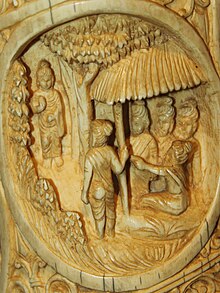Assaji
| Venerable Assaji | |
|---|---|

Buddha preaches to Assaji and his four colleagues
|
|
| Religious career | |
| Teacher | Gautama Buddha |
Assaji (Pali:Assaji, Sanskrit:Asvajit) was one of the first five arahants of Gautama Buddha. He is known for his conversion of Sariputta and Mahamoggallana, the Buddha's two chief male disciples, counterparts to the nuns Khema and Uppalavanna, the chief female disciples. He lived in what is now Uttar Pradesh and Bihar in northern India, during the 6th century BCE.
Assaji was born into a brahmin family. His father was one of the eight brahmin scholars who were invited by Suddhodana, the monarch of the Sakyan kingdom to Kapilavastu to read the fortune of his son Siddhartha. Assaji's father and six of the other brahmins had predicted that Siddhartha would either become a great religious leader or a great military monarch. Kaundinya, the youngest was the only one to confidently state that Siddhartha would become a Buddha. As a result, when Siddhartha renounced the world, Kaundinya and Assaji, as well as Bhaddiya, Vappa and Mahanama, three sons of three of the brahmin scholars joined Siddhartha in the ascetic life. The five joined Siddhartha in self-mortification practices at Uruvela. When Siddhartha abandoned this practice to follow the Middle Way, they left him in disappointment, believing he had become indulgent.
But after the Enlightenment, the Buddha visited them at Sarnath, where they had journeyed after the split. The Buddha preached the Four Noble Truths and the Dhammacakkappavattana Sutra, and they became the first five bhikkhus of the sangha. Assaji was the last to understand the teachings, and the Buddha had to give further explanations to him and Mahanama while the other three bhikkhus went out on alms round. He was the last to reach sotapanna, the first stage of arahanthood. He became an arahant, together with the others, at the preaching of the Anattalakkhana Sutra.
...
Wikipedia
